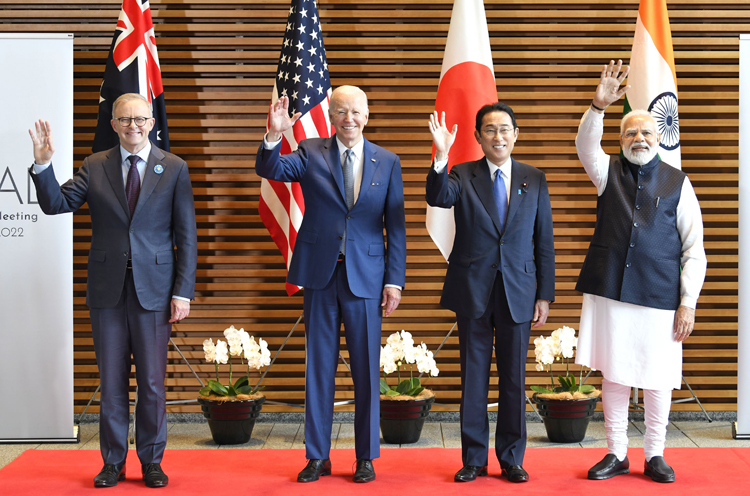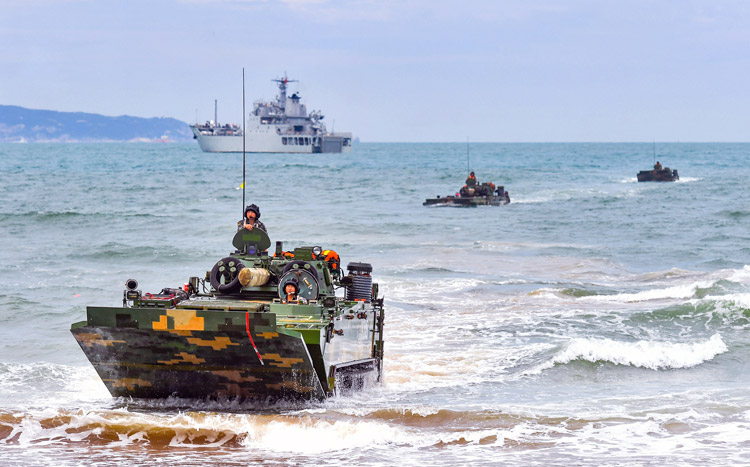INDIAN ARMED FORCES CHIEFS ON
OUR RELENTLESS AND FOCUSED PUBLISHING EFFORTS

SP Guide Publications puts forth a well compiled articulation of issues, pursuits and accomplishments of the Indian Army, over the years

I am confident that SP Guide Publications would continue to inform, inspire and influence.

My compliments to SP Guide Publications for informative and credible reportage on contemporary aerospace issues over the past six decades.
- Interim Defence Budget 2024-25 — An Analysis
- Union Defence budget 2024
- Indian Army: In quest of greater firepower and policy recommendations for gaps
- Indian Army Annual Press Conference 2024
- 6G will transform military-industrial applications
- Tata Boeing Aerospace Delivers 250 AH-64 Apache Fuselages, Manufactured in India
QUAD is Not another NATO
QUAD lacks any worthwhile muscular policy and the US will likely continue to sit on the fence and let others do the fighting
 |
The Author is Former Director General of Information Systems and A Special Forces Veteran, Indian Army |

The QUAD Leaders Summit in Tokyo on May 24, 2022, between Prime Minister Anthony Albanese of Australia, Prime Minister Narendra Modi of India, Prime Minister Fumio Kishida of Japan, and President Joe Biden of the United States was on predicable lines. As in earlier summits, there was emphasis on free and open Indo-Pacific supporting freedom, rule of law, democratic values, sovereignty and territorial integrity, peaceful settlement of disputes without resorting to threat or use of force, any unilateral attempt to change the status quo, and freedom of navigation and over-flights.
The QUAD welcomed the EU's September 2021 Joint Communication on the EU Strategy for Cooperation in the Indo-Pacific. It also reaffirmed support for Pacific Islands Forum unity and for Pacific regional security frameworks and complete denuclearisation of the Korean Peninsula.
Held in the backdrop of the lingering pandemic, the forum launched the 'QUAD Climate Change Adaptation and Mitigation Package (Q-CHAMP) and resolved to strengthen capacities concerning debt issues of countries by promoting debt sustainability and transparency in close collaboration with finance authorities of relevant countries, including through the 'QUAD Debt Management Resources Portal' consisting of multiple bilateral and multilateral capacity building assistance. The QUAD resolved to extend $50 billion plus infrastructure assistance and investment in the Indo-Pacific, over the next five years. Terrorism in all forms and support to it was denounced.
QUAD resolved to extend $50 billion plus infrastructure assistance and investment in the Indo-Pacific, over the next five years
The QUAD will coordinate capacity building under the 'QUAD Cybersecurity Partnership' and will initiate the 'QUAD Cybersecurity Day' to better protect internet users from cyber threats. Having mapped the capacity and vulnerabilities in global semiconductor supply chains, QUAD will leverage strengths for a diverse and competitive market for semiconductors; the 'Common Statement of Principles on Critical Technology Supply Chains' advances cooperation on semiconductors and other critical technologies. The QUAD resolved to cooperate in space and maritime domain awareness as well.
The Indo-Pacific Economic Framework (IPEF) is not binding but a deal that can be used to orchestrate introducing or upgrading economic and social reforms (labour rights, climate change, data flows etc) by the Indo-Pacific member nations but would 'not' grant additional market access to American economy. 13 Indo-Pacific nations including India had joined the IPEF. After the summit, Fiji also joined the framework. According to an editorial published in Jakarta Post, the IPEF announced by Joe Biden, has become "a laughingstock for the countries of Southeast Asia", which instead of real assistance received only "empty promises" from the US administration, However, the IPEF does provide India an opportunity to expand its economic cooperation with the Indo-Pacific region.
Concluding his first Asia tour after the QUAD summit, Biden told reporters in Tokyo that the US would defend Taiwan in the event of an invasion. Biden's announcement to defend Taiwan took White House officials by surprise. The very next day, Lloyd Austin, US Secretary of Defence, announced, "We remain committed to our 'One China' policy in keeping with the Taiwan Relations Act."
The Ukraine conflict has proved that the US has no stomach to take on Russia directly in a conflict so the question of Washington engaging China in the event of latter using force against Taiwan or India does not arise
Moreover, the US State Department spokesperson Ned Price announced that "the US does not support Taiwan independence and remains committed to the One China policy. We've repeatedly made it clear both in public and in private. The US does not have diplomatic relations with Taiwan." He further said that the US does have unofficial relations with Taiwan and America's stand on Taiwan "has not changed".
China has said in the past that it would not tolerate US troop presence in Taiwan. On May 20, 2022, when Biden visited South Korea, he made no mention of China and indicated he is not bothered much about North Korea – a prime concern for South Korea. In his pre-election rallies, new South Korean President Yoon Seok-youl had said he wanted to attend the upcoming QUAD summit in Tokyo but nothing was heard thereafter, perhaps without encouragement from Washington.
The Ukraine conflict has proved that the US has no stomach to take on Russia directly in a conflict so the question of Washington engaging China in the event of latter using force against Taiwan or India does not arise. The US will also be wary of imposing unilateral sanctions on China since its sanctioning Russia has backfired into high inflation in the US and Europe. There is speculation in the US media that Biden is considering lifting some of the $360 billion tariffs imposed on China by the Donald Trump administration because according to the US Treasury Secretary some of the tariffs are doing more harm to US businesses and consumers than they are to China.
China knows that Biden's promise to defend Taiwan militarily would imply what it is doing in Ukraine; provide military assistance to Taiwan; pump in arms and more arms
The US has done nothing beyond rhetoric and odd Freedom of Navigation Patrols (FONOPS) while China merrily militarised the East and South China Seas. China has now gone ahead and signed security and economic agreements with Solomon Islands and Samoa which poses a challenge to US and allies even though Beijing could not rope in all the Pacific nations.
Concurrent to the QUAD summit, Chinese and Russian military aircraft involving Chinese Xian H-6 and Russian Tu-95 strategic bombers conducted joint exercises over the region lasting 13 hours. Fighter aircraft of Japan and South Korea were scrambled to shadow the Chinese-Russian joint military exercise. After Biden's departure from Tokyo, North Korea launched an ICBM and two shorter-range weapons into the sea.

China knows that Biden's promise to defend Taiwan militarily would imply what it is doing in Ukraine; provide military assistance to Taiwan; pump in arms and more arms. Taiwan would unlikely permit the US to pump in mercenaries – the way the West is doing in Ukraine. The QUAD unveiled an integrated surveillance arrangement to monitor illegal Chinese fishing in the Indo-Pacific which is about 95 per cent of all illegal fishing in the region. But would the US act against these trawlers that may be dual tasked and armed?
The talk of QUAD being another NATO is utopian. The QUAD lacks any worthwhile muscular policy and the US will likely continue to sit on the fence and let others do the fighting to advance US national interests. That is why the US wants NATO to rework its strategy to include China.
In the event of an India-China war, there is no way that the US will get directly involved in confronting China. All it would do is to sell arms to India and at best, position an odd warship at an Indian port on basis of the Indo-US Logistics Exchange Memorandum of Agreement (LEMOA). India, therefore, should be wary of needlessly getting involved in the South China Sea, much that the US would wants so.





